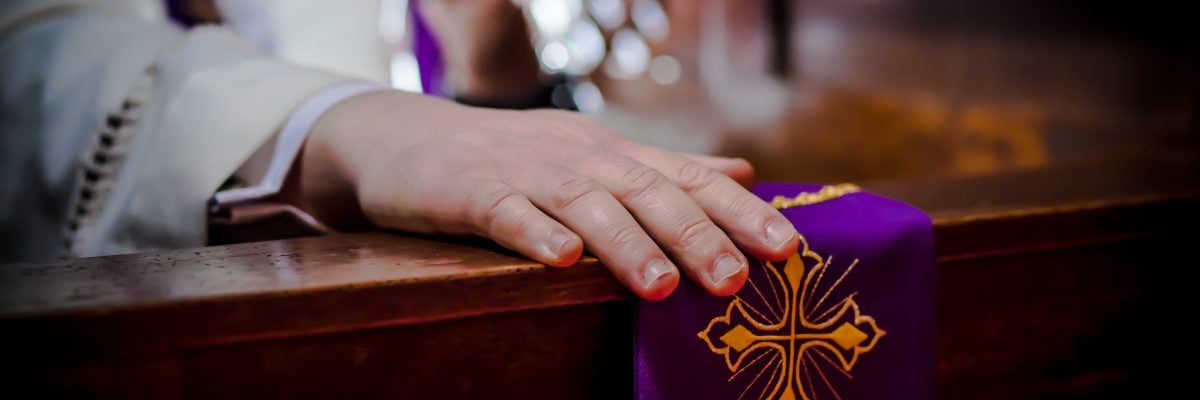
In the Hitchcock film I Confess, a priest finds himself suspected for a murder he did not commit. Complicating matters further: he knows who the murderer is, because he heard the man’s confession. But the seal of the confessional—the adamantine principle by which priests are forbidden to reveal the particulars of confessions they hear—precludes him from clearing his own innocent name.
Such is the value of this sacred trust that we are meant to view the priest’s silence as heroic virtue. It’s one of those stubbornly countercultural Catholic practices that earn the world’s grudging respect.
But apparently not always the respect of those inside the Church. In an editorial for the National Catholic Reporter, canon lawyer Fr. James E. Connell argues that the seal of the confessional ought to be broken, and civil authorities notified, when a penitent confesses sexual abuse of a minor.
My colleague Trent Horn has already written an outstanding defense of the seal even in cases where sexual abuse is confessed. He notes that in practice it’s little different from attorney-client privilege—except that no one is calling for the abolishment of that. He muses, correctly in my mind, that attempts by lawmakers to infiltrate the seal threaten religious freedom. Do read it.
Though I couldn’t add much to Trent’s fine analysis, since this issue doesn’t seem to be going away I would like to offer a few brief replies to Fr. Connell’s specific points. He writes:
Within Canon [sic] 1447 of the Catechism of the Catholic Church we read: “During the first centuries the reconciliation of Christians who had committed particularly grave sins after their Baptism (for example, idolatry, murder, or adultery) was tied to a very rigorous discipline, according to which penitents had to do public penance for their sins, often for years, before receiving reconciliation.”
Clearly, the church’s use of public penances for centuries hardly endorses a seal of confession.
Nevertheless, I realize that there are some people who hold that the seal of confession is a matter of divine law, having been intended by the Lord in the establishment of the sacrament of reconciliation and, thus, cannot be changed. However, if that were so, why did the Holy Spirit allow the church to employ public penances over the first centuries? I respond: Because the seal is not a matter of divine law.
If this is the best Fr. Connell can do to knock down the traditional weight of the seal, his arguments will not go very far. First, because the prescribing of penances with a public component is not the same as revealing the contents of a confession. Public penance would mark one as a grave sinner, but it would not necessarily reveal what his sin was. An important difference!
What’s more, St. Augustine noted that not only when the sin was serious, but also when scandal was involved, should the penitent not “refuse to do penance in the sight of many or even of the people at large.” In other words, he suggests that public penance was for those whose sins were already publicly known, and as such harmful to the Church. In any event, that public penance or even a penitent’s public avowal of sin in rare cases could at one time be imposed by a confessor as a matter of pastoral prudence cannot be equated with or offered as a pretext for a confessor’s public revelation of sins revealed to him in confidence.
Fr. Connell also employs a straw man: the idea that the confessional seal is a matter of divine law, revealed by Christ. Now, his sole argument against this idea (the existence of the ancient practice of public penance) does not truly knock down the straw man, but no matter. Whether the practice of confessional secrecy is a revealed and unchangeable truth is neither here nor there. Even stipulating that it could be changed doesn’t get you any closer to proving that changing it is a good idea, however much Fr. Connell seems to think it does.
Which is not good for his case, because the only other argument he offers is a restatement of his conclusion:
And I say that change is needed. To do so we must distinguish confidentiality that is intended by the Almighty for the common good of human life from the statute of secrecy or seal that was established by church authority.
Unquestionably, secrets have a proper place in our lives. At times, governments need secrets, businesses need secrets, families need secrets, individuals need secrets, and even the church needs secrets. Yet, if secrets contribute to endangering minors and vulnerable adults to be preyed upon by sexual abusers, that form of secrecy is immoral and perhaps illegal, depending on the civil laws at hand.
It’s difficult to slice through Fr. Connell’s ambiguous use of terms. What, for example, could “confidentiality that is intended by the Almighty for the common good of human life” possibly refer to? And who gets to decide what that is and isn’t?
And his multiplication of the word “secrets” lends an unsavory implication to the confessional seal. The “secrets” of a penitent’s confession aren’t the secrets of a corrupt government or business, or of a schoolyard pact—they’re an intimate expression of contrition between a Christian and God. It may be the priest’s ears that hear them, and his lips that speak the words of absolution, but the “secrets” are communicated to God and by him the deeds they describe are forgiven.
Most properly speaking, then, they may not even be secrets at all. Since the priest stands in Christ’s place, you could say that knowledge of the penitent’s sins never really belongs to him in the first place, whether to keep or to reveal.
Fr. Connell goes on to assert that when confessors fail to reveal sins of minor sexual abuse heard in the confessional, the “common good of the society” is harmed. Then he concludes that
my suggested change in the seal of confession law would provide an important alteration to that core—publicly disclosing sexual abusers and holding them accountable, while also protecting innocent people.
This may be the biggest head-scratcher of them all. Let’s suppose for the sake of argument that the Church could and did introduce an exception to the confessional seal (and that it would remain, contrary to all prior experience with exceptions, the only one). Now we have a well-known Catholic policy that confessions of minor sexual abuse would be documented and passed along to civil authorities, leading to, Fr. Connell is sure, “publicly disclosing sexual abusers and holding them accountable, while also protecting innocent people.”
Problem One with this idea should be obvious to you. The great majority of confessions are anonymous. The penitent’s face is veiled. Perhaps his voice could be recognized (or guessed at) if he is known to the confessor, but would the confessor bring down the law upon him on that basis? Could a criminal investigation even proceed on that basis?
And even if the answer were somehow yes, the penitent could simply avoid the problem by going to a confessor who doesn’t know him. In which case, upon hearing the confession would the priest be obliged to leap from behind the screen, switch on the lights, and ask for the man’s name and address?
The other problem, and an equally likely outcome, is that sexual abusers of minors would simply refrain from confessing this sin. That would still leave us with an unrevealed case of abuse, but now also a soul denied the grace of the sacrament—grace that, who knows, might later compel him to face up to worldly justice for his crime.
Surely this is the root practical reason for the seal: it removes a huge obstacle to repentance. Not only sexual abusers but murderers and adulterers and tax cheats would be far less likely (or flat-out unwilling) to seek sacramental forgiveness if they knew their crimes would be cataloged and revealed—even if in the name of the “common good of the society.” With the seal in place, though, however much the confessor might counsel the penitent to make amends for his sins in the worldly order, the penitent can be confident that his confession is meant strictly for the order of grace and not fear to approach it.
In conclusion, let’s return to the Catechism passage that Fr. Connell quotes in support of his proposal. He doesn’t quote the whole thing. It goes on to note that the practice of public penance gave way around the seventh century to a wholly private penance, which “opened the way to a regular frequenting of this sacrament.”
The seal of the confessional leads to more forgiveness of sins. It is fundamentally a law of mercy. Fr. Connell calls upon Pope Francis, who has so often preached mercy, to change this law. Let us hope that he does not listen.



